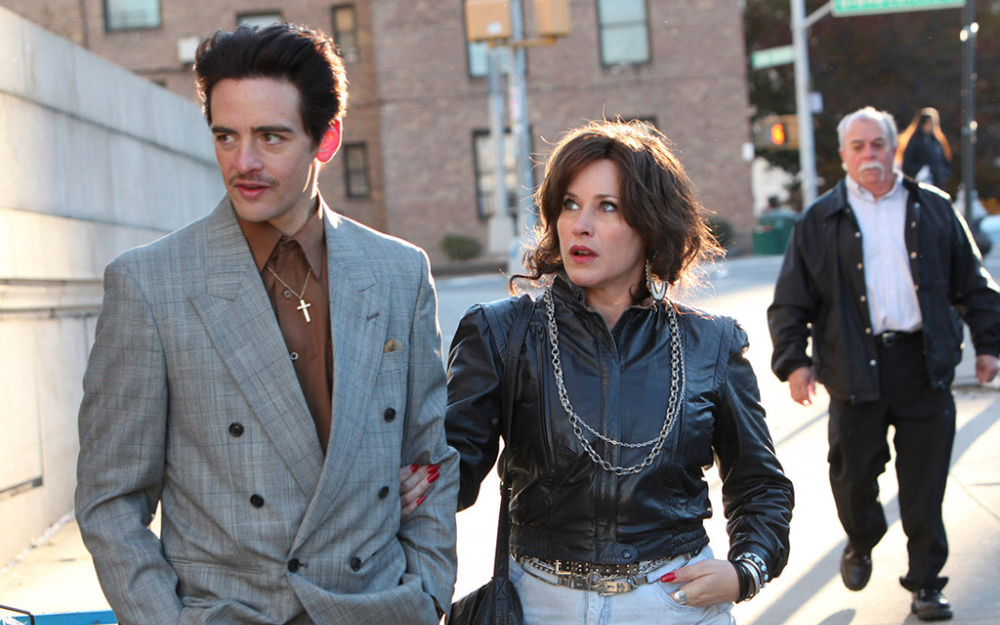When Nick Sandow was growing up in the Bronx, he recalls “there was no such thing as the mafia.”
“You didn’t ask any questions and it was just very real and practical,” says Sandow. “Uncle Frankie was in ‘college for 15 years.’ You kept asking, ‘Well, why isn’t Uncle Frankie coming home from college?’ It wasn’t until I was older I realized Uncle Frankie was in prison.”
Though Sandow was never close to that world, he was fascinated with its illusory nature, a general interest of his that would lead him to invent many personas of his own as a veteran character actor, most notably as the randy correctional officer Joe Caputo on “Orange is the New Black.” It would also serve as his way into his sophomore feature as a director, “The Wannabe,” which recounts the true-life exploits of Tommy Uva (Vincent Piazza), an aspiring hood with few connections who sees an opportunity to get traction in the New York underworld by exploiting the disarray caused by the trial of John Gotti in the early 1990s. Finding a partner in crime when his eyes lock with a vivacious woman from the neighborhood named Rose (Patricia Arquette), Tommy’s campaign to discredit Sammy “The Bull” Gravano’s testimony against his former boss may fail to win him favor, but once he gets a gun to go along with his tough guy antics, Tommy actually starts to resemble the real thing, losing his hold on reality in the process.
If the premise sounds familiar, it’s because Uva’s unbelievable exploits also inspired Raymond DeFelitta’s recent “Rob the Mob,” but whereas that film recounted the frenzy surrounding the trial, “The Wannabe” becomes an investigation of identity as Tommy works towards becoming becoming a gangster not necessarily like the ones he lives amidst, but in the mold of the ones he grew up idolizing in the movies. Quoting “The Godfather” to Rose as if were a sonnet and thrilled with the prospect of offering cocaine to Eric Roberts (played here by Jay Bulger) at a nightclub after being so taken with him in “The Pope of Greenwich Village,” Tommy’s desire to live inside a movie isolates him from experiencing the outside world. No doubt he would be thrilled to learn that the one he’s actually in was executive produced by Martin Scorsese, whose blessing of “The Wannabe” plays into the expectations of a mob movie that Sandow ultimately upends by approaching the material as a more thoughtful character study.
Shortly before the film hits theaters after a premiere earlier this year at the Tribeca Film Festival, Sandow spoke about how he was able to invest some of himself in “The Wannabe,” how his time on “Boardwalk Empire” led to finding his lead actor and what his acting experience has taught him about directing.
How did this come about?
About 10 years ago, a friend of mine gave me a few newspaper articles about this couple and I was fascinated with how they get from A to Z. I was in Spain with my girlfriend, and I wrote like 60 pages. It just flew out of me and then I put it down for about five or six years. I slowed down as an actor and I was like, “Okay, I need to write something.” I already made a feature and, so I banged [the rest of this] out and my manager, Mike Gasparro said, “I’ll produce it. Let’s try to get it made.” At first, we thought about selling it, then I realized how little money writers make for this incredibly hard job, so I thought I’m not going to do that, and I got very lucky. We did a reading for it and they cast Vincent Piazza as the lead and I thought he was amazing. Later, I just happened to be in a scene with him on “Boardwalk Empire” [as an actor] — I didn’t know him at the time — he’s like, “I really love that script,” and I said, “Well, I just decided I’m going to direct it.” He said, “Well, I’ll produce it,” and that was it. We went from there.
What was it about the story that appealed to you?
I’m from the neighborhood, just five minutes from where Thomas grew up. The genre has always intrigued me, but for years I was playing heavies or a kid from the Bronx and it worked for me as a actor, but after a while I was just done with it. I wanted no part of the genre. [With “The Wannabe,”] I felt like I could see my way into it for the first time — this idea of this person desperately wanting to be something they’re not. I spent a career doing that being something I’m not as an actor, so I related to that as the core of it and started building from there, taking this person who’s a gangsterphile and cinephile, as a way to possibly make a comment on the genre and what it means to us, certainly as Americans.
At first, there was a little deja vu for me when I saw it because another film, “Rob the Mob,” was inspired by the same couple, though this film takes it in an entirely different direction. Since these must’ve been in development at the same time, were you aware of a rival project?
We weren’t [when we started]. We were just funded and ready to take off when we got word that there was another movie. It was a bit of a panic, like, “Oh my God. How does this happen?” The truth is my script was written first, but I think it was just a strange confluence of that story being around and people putting their imagination to it and it all started to happen with everybody at the same time. I’d like to think it was just this really strange coincidence and I know we just went out and made our movie. I didn’t see [“Rob the Mob”] because I didn’t want to be influenced by it. Did I read the script? I think I sat down and I read half of it and I was like, “Okay, I have nothing to worry about. This is not our movie” and then moved on.
It actually starts with the casting — how did you pair Vincent Piazza with Patricia Arquette? They have a really interesting chemistry.
Yeah, they’re pretty amazing together. Since I had Vincent [as Tommy], we were looking for our Rose and a lot of names would come up. A lot of people would try to push me off the idea of her being older, but I was committed to that. I wanted that relationship. The real Thomas and Rose were about the same age, but I was committed to it and when Patricia’s name came up, I could not get her out of my mind. I was talking to Michael Imperioli, a good buddy of mine, and I said, “Michael, what do you think about Patricia for Rose?” He’s like, “I just worked with her in Germany and I’ll send her the script.” He did and she loved it and the image of the both of them together was just a fantasy that came true. We spent a year talking about the script. Anytime we were in L.A., we would get together with each other and read it, and Vince and Patricia bonded over it and it went from there.
Coming from an acting background, how much do you want a relationship like that to blossom on its own versus nudging it to happen as a director?
I just know what actors can bring and if you bring them into the process early, which I was committed to doing with both of them, they’re going to show up on day one being inside this script because they helped create it. I know what that kind of freedom brings to an actor and dialogue doesn’t really mean anything because they know where they’re beginning and they know where they’re ending, so they would say it however they want, whenever they want. I just give that freedom and let them go and hope for the best. I’m very attracted to movies that are made that way where actors are let off leash and they don’t have to hit their mark and they can just go. I just love watching that kind of acting and that energy on screen.
There’s a whole tangent in the film involving Eric Roberts — the real one doesn’t appear in the film, though you get a dead ringer for him in Jay Bulger — as someone Tommy actually meets. How did that come into the story?
It’s funny because when I was writing the script, it was more about a place in New York called Marylou’s. There were actually two places — one called Columbus and Marylou’s in Greenwich Village. Coming from the Bronx, I could go down into the city and go to a place like that and Sammy the Bull or Robert De Niro or Eric Roberts would be there. New York was that kind of town where New York, those circles would intersect and that’s what I was going after. There’s no real truth to myself and Eric Roberts [snorting things they shouldn’t] in a stall, but I have a feeling he might’ve spent some time in a New York stall doing exactly that. I was also definitely influenced by “The Pope of Greenwich Village.” When I was in my late teens, I saw a play “Burn This,” which was like my second or third play I [ever] saw and Eric Roberts was in it. I was like, “I want to do that.” He was just amazing, so I think that’s how Eric Roberts came about.
The person who plays him [Jay Bulger] is actually a doc maker [of the SXSW-winning film “Beware of Mr. Baker], and Vincent [Piazza] said, “I have my buddy,” and I was like, “Oh… I’m not sure. He’s not an actor.” But he [insisted] “No, he is.” Jay put himself on tape for me and I don’t even know why he thought of this, but [Jay] was a dead ringer and he had him down. He worked on him and he does an amazing job.
Since it seems like you were able to incorporate some of yourself into the film either in details like that or the feeling, when you saw the final product, were you surprised by what came out?
Yeah, I think I was, but because you write something, you make it personal. I remember watching a first assembly of it and I just remember saying, “What a couple. These people are really strange.” I just saw it in a different way. When you’re inside it, you can’t see it and probably five years from now, I’ll watch it again and say, “Whoa, yeah,” and have more of the feelings you’re talking about. I don’t have those feelings right now, but I’m very, very proud of the movie because it was really a great challenge to try and make this story personal. When you’re making it, you’re just going for it and you’re laying yourself out there vulnerable. I’m an actor, so I don’t know how to really do it any other way.
Was it any easier directing a second feature than a first?
No. [laughs]
In a word.
They’re all a monster that is trying to slay you and you’re just trying to get to the end of it. I learned so much from both of them — “Ponies,” I shot it documentary-style in 10 days, one location with two cameras. It all took place in an off-track betting parlor in real time, based on a play. It was a very different monster compared to 35, 40 locations, 20 days [on “The Wannabe”]. They both had very different challenges, but I feel like they made me grow as an artist and director in ways that I probably don’t even understand but I know are there.
“The Wannabe” will open on December 4th in Los Angeles at the Arena Cinema and New York. It will also be available on iTunes.




